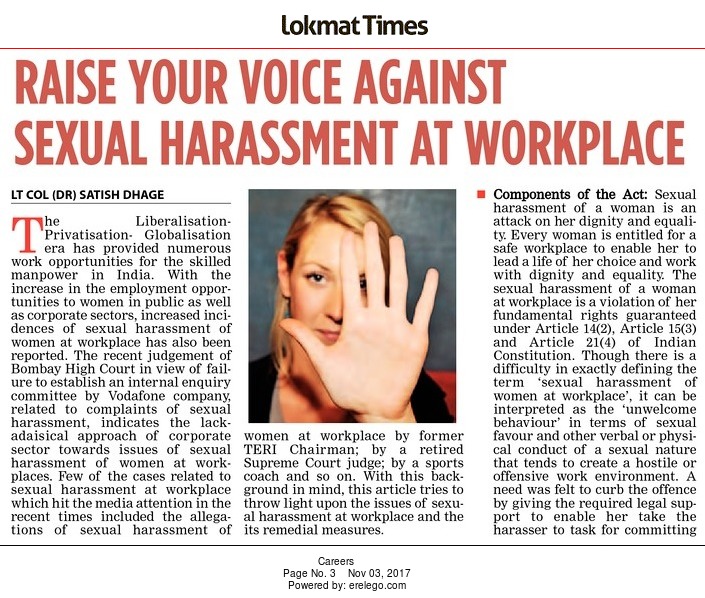RAISE YOUR VOICE AGAINST SEXUAL HARASSMENT AT WORK PLACE
The Liberalisation-Privatisation-Globalisation era has provided numerous work opportunities for the skilled manpower in India. With the increase in the employment opportunities to women in public as well as corporate sectors, increased incidences of sexual harassment of women at workplace has also been reported. The recent judgement of Bombay High Court in view of failure to establish an internal enquiry committee by Vodafone company, related to complaints of sexual harassment, indicates the lackadaisical approach of corporate sector towards issues of sexual harassment of women at workplaces. Few of the cases related to sexual harassment at workplace which hit the media attention in the recent times included the allegations of sexual harassment of women at workplace by former TERI Chairman; by a retired Supreme Court judge; by a sports coach and so on. With this background in mind, this article tries to throw light upon the issues of sexual harassment at workplace and its remedial measures. Components of the Act– Sexual harassment of a woman is an attack on her dignity and equality. Every woman is entitled for a safe work place to enable her to lead a life of her choice and work with dignity and equality. The sexual harassment of a woman at work place is a violation of her fundamental rights guaranteed under Article 14(2), Article 15(3) and Article 21(4) of Indian constitution. Though there is a difficulty in exactly defining the term ‘sexual harassment of women at work place’, it can be interpreted as the ‘unwelcome behaviour’ in terms of sexual favour and other verbal or physical conduct of a sexual nature that tends to create a hostile or offensive work environment. A need was felt to curb the offence by giving the required legal support to enable her take the harasser to task for committing an unlawful act. Various steps have been initiated by the Indian Government in this direction from time to time, in terms of ratification of UN Convention on the Elimination of all forms of Discrimination against Women (CEDAW) in year 1993; issuing of ‘Vishakha guidelines’ by Supreme Court for prohibition, prevention and redressal of an act of sexual harassment at workplace and Sexual Harassment of Women at Work Place (Prevention, Prohibition & Redressal) Act, 2013. As per the Act, the workplace involves both organized/unorganized sectors as well as public & private sectors of employment. The act makes it mandatory for the employer to constitute the Internal Complaint committee (ICC) in case of formal organisations and Local Complaint Committee (LCC) in case of unorganised sector, for investigation of sexual harassment complaints. The Composition of ICC should consist of the woman Presiding Officer, two members from the employees committed to the cause of women and one member committed to the cause of women or person familiar with issues relating to sexual harassment which includes NGO and associations. One half of the total membership should be women in this committee. Role of employer – The role of employer in prevention of sexual harassment at work place is of utmost importance. The primary responsibility of employer lies in providing safe working environment to its employees. The employer has also to ensure attendance of the Respondent & Witnesses, when enquiry is initiated with regard to complaints of sexual harassment. The employer has to provide assistance to a woman employee, if she chooses to file complaint under IPC. The employer should ensure conduct of an enquiry within a time bound manner and take action as per the existing rules and regulations of the organisation. The proven act of sexual harassment should be marked as an act of misconduct under service rules. The reporting of these incidents in the annual report of organisation is also an important duty of the employer as per this Act. It shall be an endeavour of every organisation to conduct regular sensitization and awareness programmes regarding sexual harassment at work place. It is noteworthy to mention here that as per Sexual Harassment of Women at Work Place (Prevention, Prohibition & Redressal) Act 2013, if the employer fails to form the Internal Complaint Committee or fails to take actions under section 13, 14 or 22 of the Act or contravenes or abets to contravene the provisions of this Act, he would be liable for punishment under the Act for each failed attempt and even his license to practice or carry business could be cancelled. The offences under this Act are considered as non-cognizable offences. (The author of this article ,Lt Col (Dr) Satish Dhage, is an ex Army officer and has been qualified for IPS (Indian Police Services) through IPS LCE 2012. Presently, he is Director, MGM Institute of Competitive Exams Aurangabad. For any queries or feedback, he can be contacted on email id : drsatishdhage@gmail.com)
The issues of gender equality, including the harassment of women at work place, are being discussed liberally in Indian context. The recent developments, in terms of ‘Vishakha guidelines’, Sexual Harassment of Women at Work Place (Prevention, Prohibition & Redressal) Act 2013 and some of the judicial pronouncements in these cases, are certainly the measures in right direction and would require a further push from all the stakeholders, in order to reform the patriarchal, regressive mindset of Indian society.


